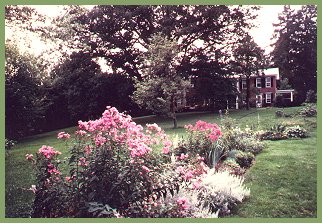
Emily Dickinson and Her Milieu
In
Memory
of Louis
Forsdale

Emily Dickinson's Garden
photo by Margaret DeAngelis, 1984

Emily Dickinson and Her Milieu
In
Memory
of Louis
Forsdale

|
Welcome to Circumference, a place for lovers
of Emily Dickinson to gather, exchange ideas, learn more about this
wondrous
poet whose work means so many things to so many people. The discussion
list is now in its fifth year of operation. To join the discussion list, visit http://lists.dreamhost.com/listinfo.cgi/circumference-silkentent.com, or write to the owner, Margaret DeAngelis. |
| Emily Dickinson is a figure in American poetry who continues
to fascinate
and perplex nearly 150 years after her death. Born in Amherst,
Massachusetts
in 1830, her early life was not unlike that of other girls who came
from
well-to-do families. She learned to cook and to sew, she studied
classical
literature, geography, history, and the natural sciences, and she
traveled
with her father to Washington and to Philadelphia when he served in the
United States congress.
Some time in her twenties, Emily Dickinson began to withdraw from ordinary society. She stopped attending church and social functions. Although she maintained an extensive written correspondence with more than a hundred people, she rarely met with anyone outside her family. Her letters often included short poems. In 1862 she wrote to Thomas Wentworth Higginson, a critic at the Atlantic Monthly, enclosing some poems and asking him for advice on the quality of her work. This correspondence continued until her death in 1886. Although many who read her work encouraged her to seek publication, she resisted, and only a few poems appeared in print, all without her name attached, in her lifetime. Following her death, nearly 1800 poems were discovered copied and handbound into packets known as "fasicles." The task of preparing this work for publication is a dramatic story in and of itself, and refinements to the canon of Emily Dickinson's work, both poems and letters, continues into the present day. Also continuing is discussion, debate, and research concerning Emily Dickinson as a poet and a woman of the nineteenth century. The developers of this site hope to contribute to the appreciation of her work and her milieu. |